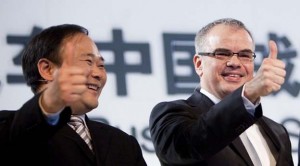
Geely Chairman Li Shufu, left, and Volvo CEO Stefan Jacoby after Shufu signed the papers to take the majority interest in Volvo Cars.
Daimler AG and its principal Chinese partner, BAIC, plan to invest almost $2 billion in a state-of-the-art factory in China, even as Li Shufu, the ambitious entrepreneur, who has made Geely into an automotive power begins to digest his purchase of a 9.7% stake in the company.
Adding to the intrigue, Daimler and BAIC, the company built around Beijing Jeep and a key Geely competitor, plan to use the money to revamp a factory they jointly own to build both Mercedes-Benz luxury and electric vehicles from Mercedes new line of electric vehicles.
The investment was clearly planned prior to Li Shufu’s dramatic disclosure he had quietly acquired 9.7% of Daimler AG’s shares. The Chinese entrepreneur, who has built his company into the largest privately owned auto company in China, also hinted that he was prepared to acquire more shares even as he prepared to visit Germany for a round of talks with Daimler executive in Stuttgart and officials from the German government in Berlin.
Daimler said little about the investment by Geely’s founder except to welcome him as a “long-term” investor. Privately, Daimler officials said they haven’t any idea about what Li Shufu has planned, noting even with his big stake he is still a minority shareholder.
(Geely founder buys 9.7% of Daimler AG for $9.2 billion. Click Here for the study.)
Analysts have speculated that Geely is looking for help with the development of electric-vehicle technology. The move poses a challenge to Daimler, which as well as its Chinese partnership with BAIC Motor Corp. has an industrial alliance to develop cars and trucks with Renault-Nissan, which owns a 3.1% stake in Daimler.
Li Shufu, who used private resources for the investment in Daimler, is hardly the first Chinese investor in a German industrial company. China is one of if not Germany’s largest trading partner and Chancellor Angela Merkel has carefully cultivated ties with China.
Meanwhile, Chinese investors in German technology companies, such as Midea, which bought Kuka, one of the world’s largest makers of industrial robots, or Weicha which bought a large stake in Kion, have tended to engage in lengthy consultation with German stakeholders.
The move by the self-made billionaire chairman of Zhejiang Geely Holding Group Co into the German auto giant is also the biggest overseas’ investment yet by corporate China in the West’s auto industry.
The purchase by Li Shufu, referred to by associates as Chairman Li, is his most ambitious yet as he tries to develop into his Chinese company in a global automaker rivaling industry leaders Germany’s Volkswagen AG, Japan’s Toyota Motor Corp. and General Motors Co. of the U.S.
(Click Here for more about GAC’s plans to be first to sell a Chinese-branded vehicle in the U.S..)
Ever since dissolving its ill-fated alliance with the Chrysler Corp., Daimler has tended to avoid talk of new combinations or alliances. Nevertheless, Daimler’s relatively small production volume, a fact that former Daimler boss Juergen Schrempp sought to fix with the acquisition of Chrysler in 1998, make its something of a potential target for ambitious investors such as Geely.
Since its founding in 1986, Geely has steadily grown into one of China’s most vibrant carmakers. It acquired Volvo Cars from Ford Motor Co. in 2007 and since then has spent $11 billion in reviving the Swedish brand. Volvo’s Swedish executives note that Geely has given them enormous leeway to run the company as the seen fit.
But Volvo has also used part of its capital infusion from Geely to finance major investments in electric drive trains and vehicles. Volvo is even in the process of building a new plant specifically designed for building electric vehicles in Chengdou, China. The plant is scheduled to open in 2019 and be the home of Polestar, Volvo’s electric vehicle brand.
Like other Chinese carmakers or carmakers heavily invested in the Chinese market, Geely is under pressure from the Chinese government to develop electric vehicles.
(To see more about other makers in China looking to sell in the U.S., Click Here.)
Geely also acquired a 49% stake in Proton last year and is a major investor in Lotus, the British engineering company and builder of sports cars as it moves to expand its automotive portfolio.
